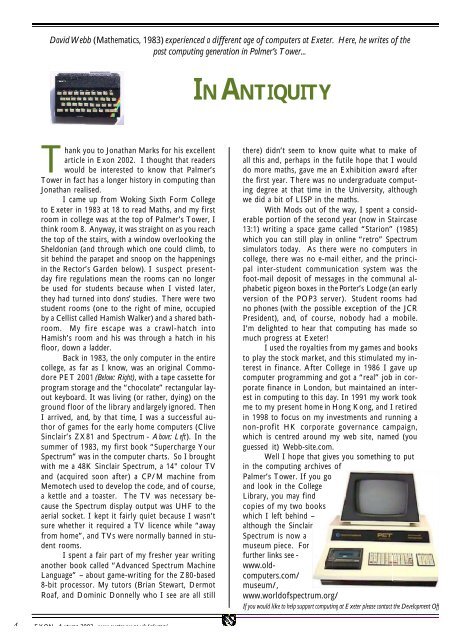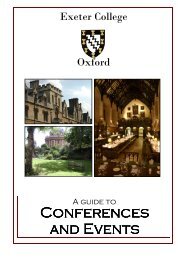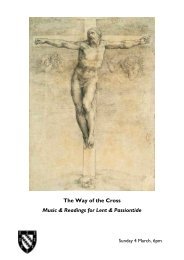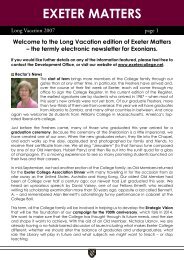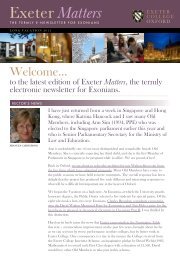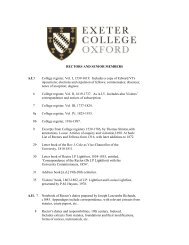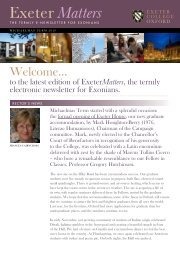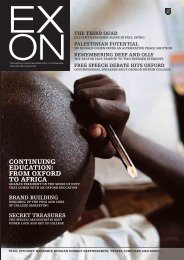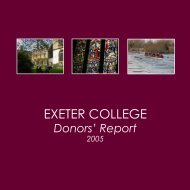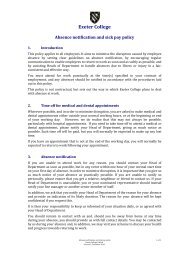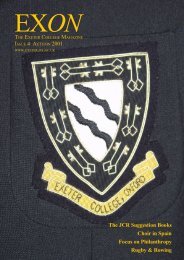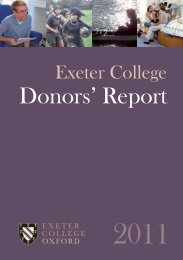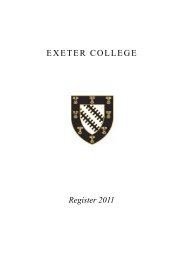2003 - Exeter College - University of Oxford
2003 - Exeter College - University of Oxford
2003 - Exeter College - University of Oxford
Create successful ePaper yourself
Turn your PDF publications into a flip-book with our unique Google optimized e-Paper software.
David Webb (Mathematics, 1983) experienced a different age <strong>of</strong> computers at <strong>Exeter</strong>. Here, he writes <strong>of</strong> the<br />
past computing generation in Palmer’s Tower...<br />
IN ANTIQUITY<br />
Thank you to Jonathan Marks for his excellent<br />
article in Exon 2002. I thought that readers<br />
would be interested to know that Palmer’s<br />
Tower in fact has a longer history in computing than<br />
Jonathan realised.<br />
I came up from Woking Sixth Form <strong>College</strong><br />
to <strong>Exeter</strong> in 1983 at 18 to read Maths, and my first<br />
room in college was at the top <strong>of</strong> Palmer’s Tower, I<br />
think room 8. Anyway, it was straight on as you reach<br />
the top <strong>of</strong> the stairs, with a window overlooking the<br />
Sheldonian (and through which one could climb, to<br />
sit behind the parapet and snoop on the happenings<br />
in the Rector’s Garden below). I suspect presentday<br />
fire regulations mean the rooms can no longer<br />
be used for students because when I visted later,<br />
they had turned into dons’ studies. There were two<br />
student rooms (one to the right <strong>of</strong> mine, occupied<br />
by a Cellist called Hamish Walker) and a shared bathroom.<br />
My fire escape was a crawl-hatch into<br />
Hamish’s room and his was through a hatch in his<br />
floor, down a ladder.<br />
Back in 1983, the only computer in the entire<br />
college, as far as I know, was an original Commodore<br />
PET 2001 (Below: Right), with a tape cassette for<br />
program storage and the “chocolate” rectangular layout<br />
keyboard. It was living (or rather, dying) on the<br />
ground floor <strong>of</strong> the library and largely ignored. Then<br />
I arrived, and, by that time, I was a successful author<br />
<strong>of</strong> games for the early home computers (Clive<br />
Sinclair’s ZX81 and Spectrum - Above: Left). In the<br />
summer <strong>of</strong> 1983, my first book “Supercharge Your<br />
Spectrum” was in the computer charts. So I brought<br />
with me a 48K Sinclair Spectrum, a 14" colour TV<br />
and (acquired soon after) a CP/M machine from<br />
Memotech used to develop the code, and <strong>of</strong> course,<br />
a kettle and a toaster. The TV was necessary because<br />
the Spectrum display output was UHF to the<br />
aerial socket. I kept it fairly quiet because I wasn’t<br />
sure whether it required a TV licence while “away<br />
from home”, and TVs were normally banned in student<br />
rooms.<br />
I spent a fair part <strong>of</strong> my fresher year writing<br />
another book called “Advanced Spectrum Machine<br />
Language” – about game-writing for the Z80-based<br />
8-bit processor. My tutors (Brian Stewart, Dermot<br />
Roaf, and Dominic Donnelly who I see are all still<br />
there) didn’t seem to know quite what to make <strong>of</strong><br />
all this and, perhaps in the futile hope that I would<br />
do more maths, gave me an Exhibition award after<br />
the first year. There was no undergraduate computing<br />
degree at that time in the <strong>University</strong>, although<br />
we did a bit <strong>of</strong> LISP in the maths.<br />
With Mods out <strong>of</strong> the way, I spent a considerable<br />
portion <strong>of</strong> the second year (now in Staircase<br />
13:1) writing a space game called “Starion” (1985)<br />
which you can still play in online “retro” Spectrum<br />
simulators today. As there were no computers in<br />
college, there was no e-mail either, and the principal<br />
inter-student communication system was the<br />
foot-mail deposit <strong>of</strong> messages in the communal alphabetic<br />
pigeon boxes in the Porter’s Lodge (an early<br />
version <strong>of</strong> the POP3 server). Student rooms had<br />
no phones (with the possible exception <strong>of</strong> the JCR<br />
President), and, <strong>of</strong> course, nobody had a mobile.<br />
I’m delighted to hear that computing has made so<br />
much progress at <strong>Exeter</strong>!<br />
I used the royalties from my games and books<br />
to play the stock market, and this stimulated my interest<br />
in finance. After <strong>College</strong> in 1986 I gave up<br />
computer programming and got a “real” job in corporate<br />
finance in London, but maintained an interest<br />
in computing to this day. In 1991 my work took<br />
me to my present home in Hong Kong, and I retired<br />
in 1998 to focus on my investments and running a<br />
non-pr<strong>of</strong>it HK corporate governance campaign,<br />
which is centred around my web site, named (you<br />
guessed it) Webb-site.com.<br />
Well I hope that gives you something to put<br />
in the computing archives <strong>of</strong><br />
Palmer’s Tower. If you go<br />
and look in the <strong>College</strong><br />
Library, you may find<br />
copies <strong>of</strong> my two books<br />
which I left behind –<br />
although the Sinclair<br />
Spectrum is now a<br />
museum piece. For<br />
further links see <br />
www.oldcomputers.com/<br />
museum/,<br />
www.world<strong>of</strong>spectrum.org/<br />
If you would like to help support computing at <strong>Exeter</strong> please contact the Development Office.<br />
14<br />
EXON - Autumn <strong>2003</strong> - www.exeter.ox.ac.uk/alumni


